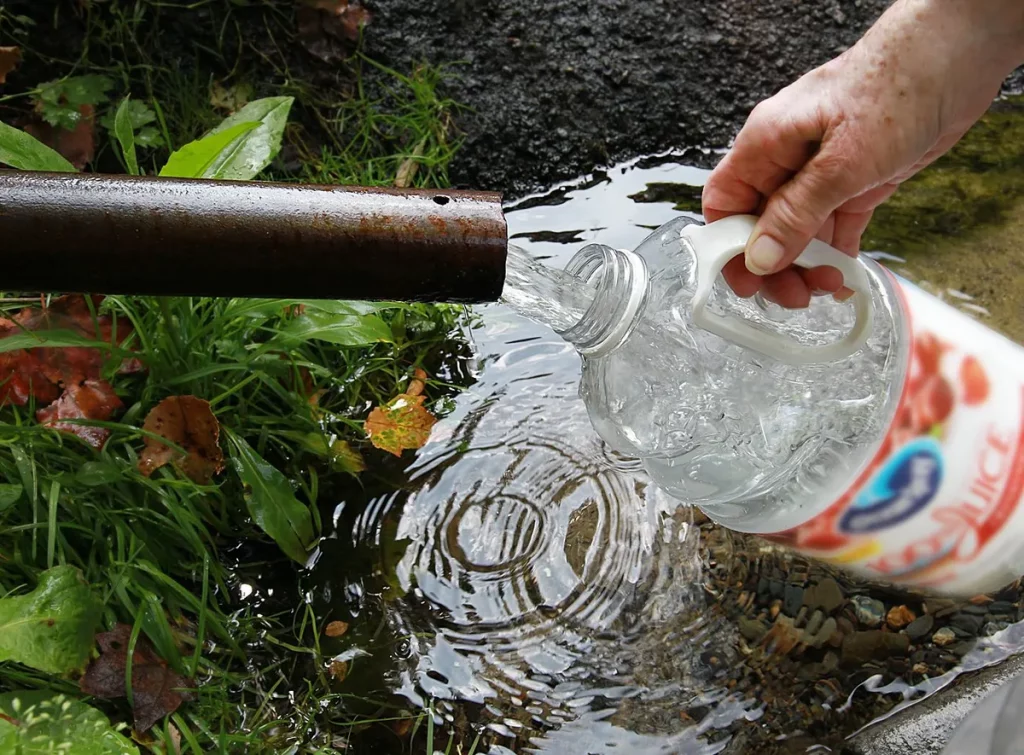Introduction
In a world where staying hydrated is not just a necessity but a lifestyle choice, the options for quenching our thirst have multiplied exponentially. Bottled spring water is one choice that has grown to be very popular. It’s not just water; it’s an experience – crisp, refreshing, and often considered the gold standard of hydration.
This article will deeply dive into bottled spring water, exploring its origins, benefits, environmental impact, and why it has become a staple in many households. The concept of bottled water is a concept that has been introduced previously.
Ancient cultures, including the Greeks and Romans, valued natural springs and their precise, vivifying waters. People would travel considerable distances to visit these springs since they were frequently respected and used for their curative qualities. The idea of bottling spring water for convenient consumption can be traced back to these early times.
The modern bottled spring water industry, as we know it today, took root in the 19th century. The development of glass bottles and the ability to preserve the freshness of spring water revolutionised the industry. The first commercial spring water bottling began in Europe and quickly spread to the United States.
What Makes Spring Water Special?
Spring water is truly special due to its remarkable qualities. It begins its journey deep within the Earth, where it is naturally filtered through layers of rock and soil. Know more here:
Natural Source
One of the defining characteristics is its source. Unlike purified or tap water, which undergoes various treatments, spring water comes directly from a natural spring.

These springs are often located deep within the Earth, and the water is naturally filtered through layers of rock and soil, making it pristine and mineral-rich.
Mineral Composition
The mineral composition of spring water sets it apart from other types of water. Spring water can contain essential minerals such as calcium, magnesium, and potassium, depending on the source. These minerals contribute to the water’s unique taste and provide potential health benefits.
Taste and Purity
One of the most distinctive features of bottled spring water is its taste. Many people find spring water crisper and more refreshing than tap water. The absence of additives and the natural filtration process contribute to its purity and taste.
The Health Benefits of Bottled Spring Water
Spring water’s mineral content can be good to your health. Calcium and magnesium, for example, are vital for bone and tooth health, as well as muscle function and overall well-being. Here’s why it’s considered a smart choice for your well-being:
Mineral Enrichment
The mineral content of spring water can be beneficial for your health. Calcium and magnesium, for example, are essential for maintaining strong bones and teeth and promoting muscle function and overall well-being. Spring water can help supplement your mineral intake, especially if your diet lacks these nutrients.
Improved Hydration
Hydration is vital for maintaining bodily functions, and drinking spring water can be an excellent way to stay hydrated. The refreshing taste and natural mineral composition make drinking more appealing, encouraging people to consume more daily water.
Reduced Sodium Intake
Spring water typically has lower sodium levels than some types of bottled water that may undergo sodium-adding treatments. People who need to limit their sodium consumption because of health issues like high blood pressure may find this helpful.
Enhanced Digestion
Some mineral-rich spring waters have been associated with improved digestion. The minerals can help balance the body’s pH levels, promoting a healthy digestive environment. Additionally, the consumption of spring water may help alleviate symptoms of indigestion and heartburn for some individuals.
Environmental Considerations
While bottled spring water offers numerous advantages, it’s important to consider its environmental impact. Here are key factors to keep in mind when evaluating the ecological aspects of choosing bottled spring water:
Bottled Water Industry’s Impact
While bottled spring water offers undeniable benefits, it also raises environmental concerns. Plastic bottle production, transportation, and disposal contribute to pollution and resource depletion.

The bottled water industry has faced criticism for its ecological footprint, particularly regarding single-use plastic bottles.
Sustainable Practices
Many bottled water companies have adopted more sustainable practices to address these concerns. Some have transitioned to using recycled and eco-friendly packaging, while others invest in water conservation initiatives and community engagement to minimize their environmental impact.
Consumer Responsibility
Ultimately, consumers play a significant role in reducing the environmental impact of bottled spring water. Opting for reusable water bottles and recycling plastic bottles can mitigate the adverse effects of single-use plastics.
Choosing the Right Bottled Spring Water
Source Location
The source of bottled spring water can significantly influence its taste and mineral composition. Different springs around the world yield water with unique characteristics. Some brands proudly emphasise their specific source location, making it an essential factor for consumers who appreciate regional distinctions in taste.
Mineral Content
The mineral content of spring water varies between sources. You can choose spring water with higher or lower mineral concentrations depending on your dietary needs and preferences. Reading the label can provide information on the water’s mineral composition.
Packaging
Consider the packaging when choosing bottled water. Many brands now offer eco-friendly options such as glass bottles or recycled plastic. These choices align with sustainability efforts and reduce the environmental impact of your bottled water consumption.
Spring Water and Your Lifestyle
Everyday Hydration
Spring water in bottles is an excellent option for everyday hydration. Its refreshing taste and potential health benefits make it a go-to choice for individuals who prioritise staying well-hydrated throughout the day.
On-the-Go Convenience
The portability of bottled spring water makes it ideal for people with active lifestyles.

Whether heading to the gym, hiking, or running errands, having a bottle of spring water on hand ensures you stay hydrated wherever you go.
Culinary Use
Don’t limit these water to drinking alone. Its pure and crisp taste can enhance the flavors of your favorite dishes. From cooking to baking, using spring water in your recipes can make a difference in the final result.
Conclusion
Bottled spring water is more than just a beverage; it’s a testament to the natural wonders of our planet. Its origins in ancient civilizations, mineral-rich composition, and refreshing taste have made it a sought-after choice for hydration. However, it’s essential to be mindful of its environmental impact and choose brands prioritizing sustainability.
Ultimately, it offers a refreshing and healthful option for quenching your thirst, whether at home, on the go, or in the kitchen. As with any product, making informed choices that align with your values and needs is critical to enjoying all that bottled spring water offers.
Bottled spring water is more than just a beverage; it symbolizes purity and a commitment to a healthier lifestyle. With its exceptional taste, mineral-rich goodness, and environmental consciousness, it’s a choice that resonates with those who value quality hydration.

